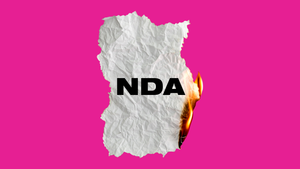The music industry has welcomed the news that the UK government is banning the use of non-disclosure agreements to silence employees who have been victims of sexual harassment or discrimination in the workplace.
Such a ban was a key recommendation of the ‘Misogyny In Music’ report produced by Parliament’s Women And Equalities Committee, which said NDAs have been used by music businesses seeking to cover up sexual harassment and abuse that occured within their companies. That practice will now be prohibited via an amendment to the Employment Rights Bill that is currently working its way through Parliament.
Expanding on why the NDA ban is necessary, Naomi Pohl, General Secretary of the Musicians’ Union, tells CMU, “NDAs have been used to silence too many victims of harassment in the creative industries and beyond”. In some cases, she adds, “survivors are prevented from talking about abuse they’ve suffered which is potentially criminal”, which means “serial perpetrators are protected”.
Pohl also believes that “coercion is a factor when NDAs are signed in exchange for large sums of money in harassment cases”, and that, she says, is “where the imbalance of power can be most evident”.
The government’s legislative steps, coupled with industry led initiatives, should now result in positive change. “This progress and the establishment of the Creative Industries Independent Standards Authority”, Pohl says, “will be welcomed by survivors as steps towards ensuring safety at work and that serial perpetrators can no longer hide in the shadows of our industry”.
Live sector trade group LIVE has also welcomed the NDA ban and, like Pohl, stressed that both legislative measures like this and industry-led initiatives are required to end misogyny in the music sector.
Gaby Cartwright, LIVE’s Head Of Partnerships, says, “the live music industry is taking substantial steps to address the deeply rooted, complex issues of misogyny and discrimination but the industry cannot do this alone”. Government and industry must work together “to deliver the necessary resources and framework to bring about further meaningful change for workers and eradicate misogyny”.
In its statement welcoming the government’s amendment to the Employment Rights Bill, the Independent Society Of Musicians also adds that it is seeking assurances from ministers that the NDA ban will apply to freelancers as well as formal employees.
It’s believed that is the intent of the government, but with so many people in the music industry working on a freelance basis, it’s important that is clearly stated in the final version of the new law.
ISM CEO Deborah Annetts says, “Our research has shown that the use of NDAs is a massive issue in the music sector. We are seeking assurances from the government that these reforms will cover all who work in music since so many workers are freelance. It is fantastic that after years of campaigning the government has listened to us”.
In its most recent report on misogyny in music, the Women And Equalities Committee explained how some music companies have used NDAs to “prevent victims of discrimination, harassment and abuse from speaking about their experiences or from pursuing a resolution via the Employment Tribunal”.
Women who spoke to the committee also “described how they were coerced into signing by businesses who threatened to ruin them financially or reputationally if they refused”.
In a bid to end that immoral practice, MPs called on the government to “urgently bring forward legislative proposals” that would ban the use of NDAs in cases of sexual abuse, sexual harassment or sexual misconduct, or bullying or harassment more generally.
The government’s amendment to the Employment Rights Bill will do just that. According to an official statement, it will “void NDAs used by employers against employees who have been subjected to harassment, including sexual harassment or discrimination in the workplace”.
Commenting on the move, Deputy Prime Minister Angela Rayner adds: “We have heard the calls from victims of harassment and discrimination to end the misuse of NDAs. It is time we stamped this practice out - and this government is taking action to make that happen. The Employment Rights Bill will ban any NDA used for this purpose, so that no one is forced to suffer in silence”.

